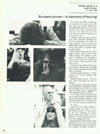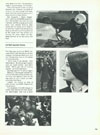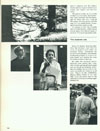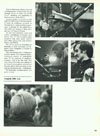
vote, thema nd their "Student Non-violent Coordinating Committee." The Old South rose up and showed 'em, however, bumped off three of 'em and proved that wise-acre kids from Connecticut couldn't move in and run their affairs. But doggone it those Nigger-lovin' kids had LEARNED soemthin' from the broken ribs and the logn marches andthe singing and pretty soon they started thinking they could tell the whole world what to do and that maybe they should stop singing and sart punching and just at the same time the blacks quit turning the other cheek the students learned to do the same and then all hell busted loose. The Non was gone and SNCC became SVCC and the blacks started helping themselves thank-you and the Yankee kids took on the whole kid-and caboodle. "We'll cuss if we please," said Mario Savio. "Build your gymnasium over our dead bodies." said Mark Rudd. "We've got 'em all running scared," said Carl Davidson. But that was the TV version again. Behind all the hoopla and the sit-ins and the wild clothes and the pit-taunting, the demand went all the way back to John Locke, as interpreted by Tom Paine. Justice, not sooner or later or after the war, but NOW! That's what it is all about. The students of the 60's began tot realize that despite all their apparent advantages, they had a great
deal in common with the militant blacks and the migrant workers and maybe, just maybe, with the Viet Cong. The enemy is big-as big as the United Fruit Company, General Motors, Dow Chemical and the Pentagon all rolled into one. It had all the power that big money and the pigs and the establishment propaganda machine could provide. To oppose all that, the students had only themselves, a little excess energy and a fairly decent grasp of the truth. The result was predictable. The students lost. Since the student does not rebel from the stomach, but from the mind, he gives in more easily. He becomes bored, rationalizes his boredom as frustration, and retreats to become a hippie or a man-in-a-gray-flannel suit, leaving his mess for someone else to clean up. But after the would-be revolutionaries have packed their bags, after the tear gas has all blown away and the House Un-American Activities Committee has done its bit, oh wow-students are cropping up all over. They're on the committees, they're being invited to run over their thing one more time for the information of some suddenly eager bureaucrat.
Even in Nebraska, where copy-cat revolutionaries occasionally stir up enough fervor to walk out of the Union, students are beginning to have a voice in their affairs. Student power in Lincoln is the bastard offspring of the Movement. It owes its existence primarily to the television camera which graphically illustrates for the administration what can happen if they don't give an inch here and there. So the administration does give a little-grudginly, of course-and within four or five hundred years students may have some control over their curriculum, over women hours, over ROTC. It's not as good as Columbia or Berkeley or even Colorado, but its' better than Creighton or Doane or Wayne State. Like everything else in Nebraska student power is a watered-down innocuous version of everywhere else. To the majority of students, however, that is for the best. The only thing that interrupts classes is an honors convocation, and serious thought about the problems of our age can be postponed-indefinitely. For Nebraska, student power is a point in time: roughly 2001 a.d. Source:
Author: Jack Todd | |||||||||||||||||||||||||
| |||||||||||||||||||||||||



